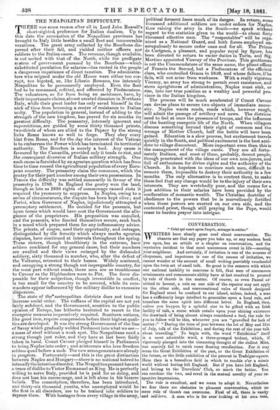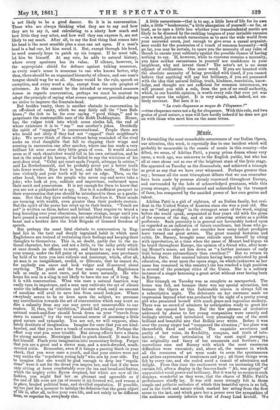CONVERSATION.
" Celui qui court aprea l'esprit, attrappe 1a sottise." •
WRITERS have clearly gone mad about conversation. The chances are that any paper you take up, or any modern book you open, has an article or a chapter on conversation, and the mysteries incident to that most uncommon event in life—meeting your neighbour. And certainly, if irritation is one of the sources of eloquence, and impotence is one of the causes of irritation, we cannot wonder at the amount of small writing peevishly vouchsafed upon the twin art of small talk. So great is the concern with which our national inability to converse is felt, that men of uncommon attainments and consummate ability have at last resolved to proceed by rule of thumb in the matter. Of course, as even Pascal ad- mitted to lament, a rule on one side of the equator may not apply on the other side, and conversational rules of thumb designed for England must be confined to our island, unless, indeed, a man has a sufficiently large intellect to generalize upon a local rule, and transfuse the same spirit into different letter. In England, then, unless you happen by a spiteful star to be gifted with an Irish facility of talk, a curse which entails upon your shining existence the drawback of being almost always considered a fool, the rule for you to follow will be this, whenever you are "gravelled for lack of matter :" " During the time of year between the 1st of May and 31st of July, talk of the Exhibition; and during the rest of the year talk about travelling." To begin with, the word "Exhibition" itself is a most admirable word, a three-pronged trident, which, if vigorously plunged into the simmering thought of the dullest Miss, can scarcely fail to catch some floating recollection. For it may mean the Great Exhibition of the past, or the Great Exhibition of the future, or the little exhibition of the present in Trafalgar-square. Here then is a boundless field in which to ramble o'er a mimic world without having left England. But if you have left England, and belong to the Travellers' Club, so much the better. You can combine the two, and revel in the mutual novelty of your re- spective impressions.
The rule is excellent, and we mean to adopt it. Nevertheless we fear there are obstacles to pleasant conversation, which no mere rule of thumb can overcome. First of all, there is vanity and self-love. A man who is for ever looking at his own toes, is not likely to be a good dancer. So it is in conversation. Those who are always thinking what they are to say and how they are to say it, and calculating to a nicety how much and how little they may utter, and how well they can express it, are not likely to say much. After all, to say the first thing that comes into his head is the most sensible plan a man can act upon. If a man's head is a bad one, let him mend it. But, except through his head, he need scarcely hope to patch up his tongue. If he must talk, let him be himself. At any rate, he adds to natural history, where every specimen has its value. If silence, however, is the appropriate shield for defence against talking nonsense, as every man's sense is nonsense to one who knows better, why then, there should be an organized hierarchy of silence, and one man's tongue should wag for us all. Silence would be the rule, speech an exception, and every word a slip, except from the sole prophet of utterance. As this cannot be the intended or recognized summum bonum as regards conversation, perhaps we must be content to adopt the principle of saying what comes uppermost, provided always we strive to improve the fountain-head. But besides vanity, there is another obstacle to conversation in an off-shoot of vanity, which we may fairly call the " lues Bub- biana ;" the itch to be for ever saying " good things," and to perpetuate the contemptible race of the Bubb Doddingtons. Hence, too, the vulgar trick into which some circles fall, the end of whose existence it is to " cap " one anther's jokes. Decidedly the spirit of " capping " is unconversational. People there are who could not sleep if they had not "capped" their neighbour's joke. We never think of them without being reminded of the rival cocks on rival dunghills that fall to clapping their wings and crowing in succession one after another, where one has made a very brilliant hit over some dirty little grain of corn. It would almost seem as if each chanticleer would fall in his own estimation, and be lost in the mind of his harem, if he failed to cap the witticism of his next-door rival. " Celui qui court apres resprit, attrappe la sottise," said La Rochefoucauld, and he probably never put a better truth into fewer words. Ripe fruit is best, and falls easily. Shake the tree violently and your teeth will be set on edge. Then, on the other hand, there are the people who never cap and never take a joke; who look at you, sublime and impervious, enthroned upon their merit and .possessions. It is not enough for them to know that you are not a pickpocket or a spy. Nor is it a sufficient passport to their conversation that you should be introduced to them as a gentle- man. Not that they have nothing to say. Far from it. Their minds are teeming with wealth, even greater than their. pockets contain. But the spirit of the purse has crept up to their brains. "Touch me not" is written on them, before and behind. They require to brood a long brooding over your obnoxious, because strange, image until you have passed a moral quarantine and are admitted from the ranks of a beast and a brother into the Irish Brigade of licensed freedom of speech. But perhaps the most fatal obstacle to conversation in Eng- land lies in the tacit and deeply ingrained habit in which most Englishmen are trained of restraining their feelings and keeping their thoughts to themselves. This is, no doubt, partly due to the na- tional character, but also, and not a little, to the sulky pride which at once dreads an offence to caste, and fears to say a word which your enemy, under the fell guise of an acquaintance, may perchance lay hold of to turn you into ridicule and contempt, which, after all, no man is so insignificant, sordid, or illiterate, that he cannot do, for anybody can sneer and look vulgar and ill-natured about anything. The pride and the fear once repressed, Englishmen t as easily as most races, and far more naturally. He who keeps his arm in a sling is not likely to have the use of it long. So
i
it is with conversation. What was once a natural function may easily turn to impotence, and a man may cultivate the art of silence under the influence of criticism and the east wind, until no amount of sunshine will avail to save him from moral lock-jaw. Where everybody seems to be so keen upon the subject, we presume any contribution towards the art of conversation which may avert so dire a calamity from any one may prove not unacceptable to our readers. It then, the " exhibition," should fail you and your conver- sational coach-and-four should break down on your "travels from dawn to sunset," try the very unusual course of assuming a little good nature and sympathy. You are not, we will suppose, abso- lutely destitute of imagination. Imagine for once that you are kind- hearted, and that you have a touch of common feeling. Perhaps the effort may cost you some trouble. But strong efforts have a charm for strong natures. Montaigne liked to pinch himself. It made him feel himself. Pinch your imagination into momentary feeling. Forget that you are a great and a clever man, and a much-dreaded, much- revered critic. Remember, even if it brings a passing blush to your cheek, that you were once a youth, and that your sisters were not very unlike the "regulation young lady" who sits by your side. Try to imagine that she would be glad enough to drop her "regula- tions" were it not for the dread you inspire her, and that if she were only sitting at home comfortably over the tea and bread-and-butter, which the mighty. critic Byron despised, but which are now all the fashion, you might find her . as pleasant and agreeable as if the end of life were not (as of course it is) fevered wit, and venom a la glace, broiled political bone, and devilled reputation. If possible, try too just for a moment to indulge the delusion that the great object
i of life is, after all, to live your own life, and not solely to be different from, or superior to, everybody else.
A little earnestness—that is to say, a little love of life for its own sake, a little " bonhommie," a little abnegation of yourself—so far, at least, as to care a little less whether your transcendental merits are likely to be dimmed by the cackling tongues of your invisible enemies —in a word, just so much earnestness as to save the wide world from your universal scorn, just enough to give even a casual acquaint- ance credit for the possession of a touch of common humanity—will go far, you may be certain, to spare you the necessity of any rules of thumb to ensure your sublimity against the possible chance of having nothing to say. If, however, while to converse remains a necessity, you have neither earnestness in yourself nor confidence in your neighbour, why not invent them ? The actor's art is no mean adjunct of civilization. One more word. If you are haunted with the absolute necessity of being provided with tinsel, if you cannot believe that anything will pay but brilliancy, if you are possessed with the idea that natural feeling , truth, kindness, conviction, know- ledge, and thought are not sufficient for common intercourse, we will present you with a rule, from the pen of no small authority, which, in our humble opinion, is worth every rule that ever yet was penned upon the subject. It is very simple, and, indeed, not en- tirely reverent. But here it is :
"La vraie eloquence se moque de Peloquesee ' —true eloquence cares not a fig for eloquence. With this rule, and two grains of good nature, a man will fare hardly indeed if he does not get on with those who meet him on the same terms.































 Previous page
Previous page